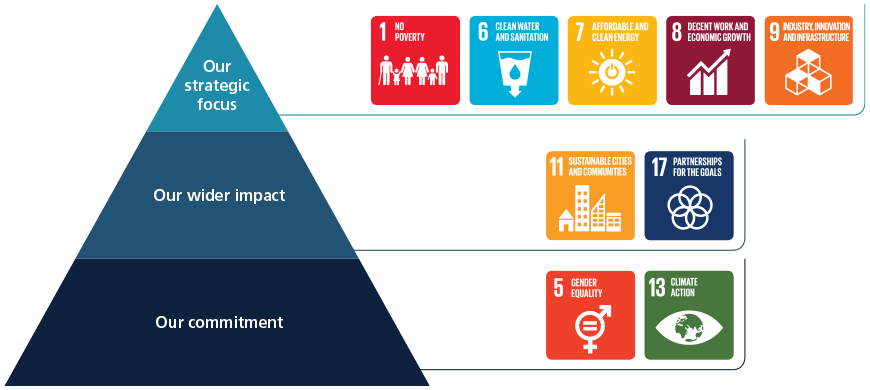Meeting the SDGs
Investment in, implementation of, and provision of financing or support to infrastructure is critical to achievement of the SDGs. Our strategy contributes to this in several ways.
Our activities are at the heart of what is needed in order to deliver the SDGs. All of our activities are designed to have a pathway to poverty reduction, contributing to SDG 1, and all are designed to enable decent work and economic growth (SDG 8). Our investments in specific sectors deliver against SDG 6 (clean water and sanitation), SDG 7 (affordable and clean energy) and SDG 9 (industry, innovation and infrastructure).
PIDG focuses solely on infrastructure, which is critical to the achievement of the SDGs

Our focus on infrastructure gives us a unique ability to focus on its critical role in underpinning economic growth and improvements in people’s lives. SDG 9 refers to the need to develop quality, reliable, sustainable and resilient infrastructure, to support economic development and human well-being, with a focus on affordable and equitable access for all and emphasises the importance of facilitating this in developing countries ‘through enhanced financial, technological and technical support’. These elements are central to our mission.
A range of SDGs highlight the importance of action in enabling access to infrastructure in specific areas: increased access to affordable, clean energy, to clean water and sanitation, to information and communications technology, to adequate, safe, affordable housing and to safe, affordable, accessible and sustainable transport systems. We contribute to these goals in a clear and measurable way.
We also contribute to the improvement of people’s lives through the role that infrastructure plays in underpinning economic growth and job creation. Where businesses have cheaper or more efficient power supplies; better routes to market; improved communications; or enhanced irrigation, storage or processing facilities; this should enable them to become more productive and enable them to grow and employ more people. Therefore, where our investments improve the availability and cost of infrastructure, this can increase the opportunities for full and productive employment and decent work. This in turn will create opportunities for local employment allowing people not to have to leave/migrate their countries in pursuit of economic opportunities.
Our strategy has an enhanced focus on the affordability of the infrastructure we are supporting. We will test how each investment is expected to improve access to infrastructure, whether for low-income individuals or for businesses or for both. Where we can support areas of economic activity with associated infrastructure, we may be able to forge strong links so that the revenues of the businesses and the infrastructure providers are mutually supported.
Gender equality is another universal principle core to achievement of the SDGs and embedded in our approach in a number of ways. First, there is the requirement for all parts of the portfolio to have policies and processes in place to safeguard against violence against women and girls and to respond immediately in the event of any possible concerns. Second, PIDG, its companies and its projects have policies on non-discrimination in place. Third, we are trialling a framework for assessing which projects can deliver empowerment for women. We will be considering what should be a realistic level of ambition for our companies in terms of selecting projects that can have a particularly positive impact on women and girls and/or using grant funding from TAF to enhance the design of projects to achieve better outcomes for women and girls.
We also contribute to the SDGs relating to the battle against climate change, continuing to prioritise renewable technologies in project selection. Coal projects are excluded. Projects relating to other thermal technologies will only be considered under specific circumstances: where there are clear pro-poor benefits; where there are no viable alternatives and the solution, such as baseload power is better than the status quo, and part of a longer-term view to move towards a cleaner energy/low carbon pathway; and in consultation with experts on the low-carbon transition.
It is also clear that the SDGs will only be achieved if organisations like PIDG can mobilise private sector capital at scale. Through our Credit Solutions businesses, we have shown that we are successful at mobilising private sector investment financing to infrastructure projects, drawing in funding from sources such as local pension funds which have not been willing to invest in those types of projects before.
